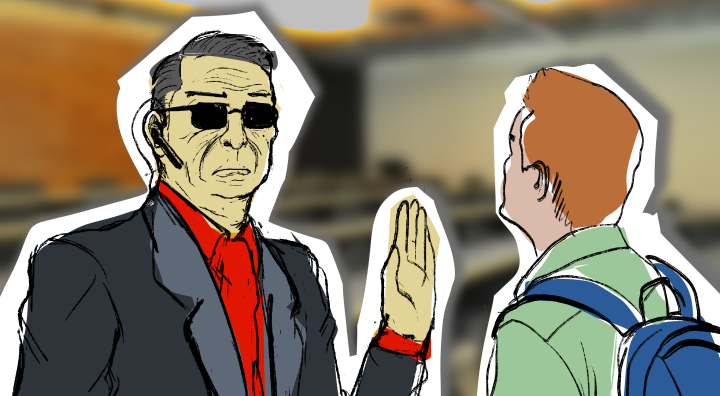Just before UMSU election season, one of my best friends asked me: “UMSU is facing impending tuition hikes and major challenges as a student union. Why run for president?”
On the contrary, I do not see this year as one in which student leaders are boarding a sinking ship. We have an opportunity to define the type of education that will exist for current and prospective students at the U of M and across our province. This fight is not about me, about UMSU, or about any subset of student leaders. It is about the students, and so it must emanate from a collective, educated, and mobilized student body ready to define our future.
How we got here
The latest provincial budget includes a 0.9 per cent cut of $6.3 million to post-secondary institutions. The cut, which nearly triples when adjusted for inflation, will result in a net negative in real dollar university funding – even when offset by the impending tuition hike. Based on reasonable estimates, increased tuition would total approximately $7 million in additional revenue for the U of M next year.
At committee hearings on Bill 31 – legislation which allows for mild annual tuition hikes at post-secondary institutions – a representative of the University of Manitoba Engineering Society spoke in support of the bill as long as student tuition fees are used “to directly improve the quality and quantity of undergraduate student education and resources.”
This was a reasonable position many students put forth, albeit premised on the hope government would operate in good faith after being offered this social licence. Initially, it seemed to be backed up by statements given by Minister of Education and Training Ian Wishart, who promised Bill 31 would provide “better quality education […] and better professors.”
This has since proven to not be the case.
After releasing the Manitoba budget, Minister of Finance Cameron Friesen said post-secondary institutions should look to the tuition hike as a way to make up for budget cuts.
We are now in the least desirable position for any stakeholder at our university. Costs are rising, budgets are being cut, and our increased tuition money will effectively be used to finance the provincial government’s debt. To make matters worse, international students – who have long been unfairly treated at this university and at others across the province – are now at risk of losing their healthcare coverage. It is often said that the strongest actions are brought forth by the direst circumstances. If there was ever a time for students to come together and take action, it has arrived.
The road ahead
It’s easy for me, during an election campaign, to look back at past UMSU executives, criticize their flaws or perceived inaction, and tell you how my team will fix these issues and go about our business differently. But it is a lot harder to make meaningful change on this campus and in this province when students make up a minority of the votes on all university governing bodies. Other than offering our best elevator pitches and attending whatever meetings they are willing to grant us, we ultimately have little say with the provincial government.
That is why we must look toward structural means of change. Advocacy can no longer be confined to the boardroom. It must be a continual process of student leaders making genuine connections with students, and with each other – even if we don’t always agree on everything. It means we must be making the effort to educate students about the issues that face them. We must be willing to take a stand and mobilize students to take action when they see injustices that face not only us, but also face future students whose future will be shaped by us. When we do enter the boardroom, we must go with thousands of students at our side.
At its core, the provincial budget is a ranking of priorities. The government is correctly saying that it does not have funds to cover all the services we would like to see. But if there is one thing that is clear from this budget, it is that students are not being prioritized. From a policy perspective, there is little sense in this decision.
High rates of post-secondary graduation are a strong predictor of a successful society. High graduate rates are correlated with lower crime rates and graduates from post-secondary institutions become positive economic contributors to society – boasting higher earnings, paying more in taxes, and receiving less in government transfers. But when post-secondary education becomes more expensive, fewer have access to it, and when budgets are cut, the value of our degree lessens. Further, why should international students, who are a significant economic boon for our province, want to make their lives in a province where the tax-rebate incentive was taken away, their health care may be cut, and our university will soon offer a lower quality education at a higher price?
Perhaps what carries more weight with government than any policy argument is the fact that students are perceived as disengaged, apathetic, and – most importantly – non-voting members of society: a perception that is likely more factual than we would wish to admit. We, as students, need to change the discourse regarding students and student issues. Access to, and quality of, post-secondary education can affect our province’s economic outlook and its future generations. We need to take that seriously and ensure these issues are a top priority for all Manitobans and our government. But before we can do that, we need to show that they are a priority for us.
Whether you are in favour of tuition hikes or against them, are eager to start a student strike or prefer to work behind the scenes, involved in student councils or here to focus on your degree, I promise that my team and I want to hear from you as we take on this challenge to create an accessible, high quality education for students at the U of M. Above all else, I promise we will work as hard as we can to represent your voices this year, no matter how disparate they might be. But in order to represent them we need to hear them. This is our fight, but in order to win we must be in it together.
Jakob Sanderson is UMSU president-elect and currently serves as Arts Student Body Council president. If you want to get involved in creating better post-secondary education in Manitoba, please find him on Facebook or email at jlsand16@gmail.com.





